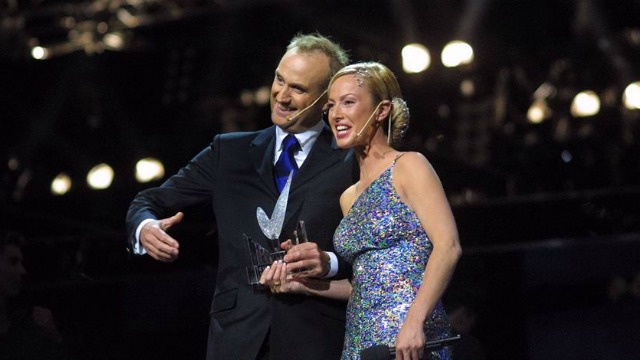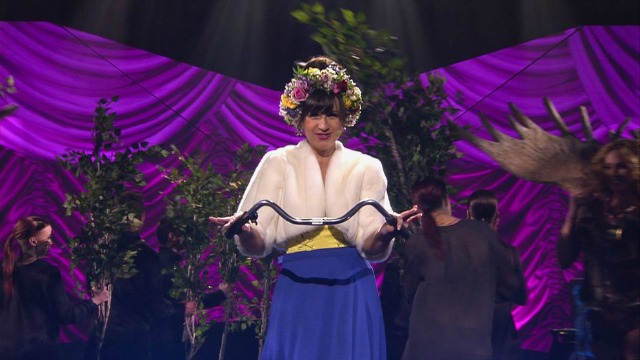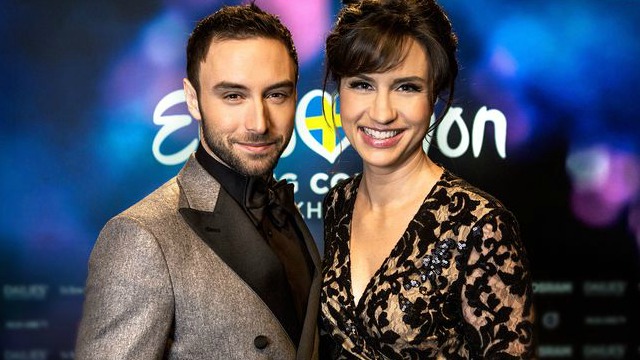The on-stage host plays one of the most important roles in any Eurovision Song Contest, but given the generally functional nature of their job, the selection of an appropriate local professional doesn’t tend to trigger particularly wild speculation. However, in the immediate aftermath of Sweden’s victory in Vienna last year, there was one question on almost everybody’s lips – would Petra Mede be returning in her capacity as program leader? In stark contrast to almost any hosting team before or since, such was Mede’s impact during the 2013 Contest, that it seemed almost inconceivable that anybody else could be given the job.
To put Mede’s achievements into context, you only have to consider her popularity in contrast to other recent hosts of the competition. With the best will in the world, should Austria win the competition on Saturday, it seems doubtful that anybody will be crying out for the return of Mirjam Weichselbraun, Alice Tumler and Arabella Kiesbauer in 2017. The Danish trio of Lise Rønne, Nikolaj Koppel and Game of Thrones star Pilou Askbæk made a clear effort to live up to Mede’s comic impact, but a bizarre attempt to strike a chord with Eurovision’s hitherto little recognised Chinese-speaking fanbase didn’t exactly have audiences rolling in the aisles.
This is not to denigrate what any of these talents – or the countless other professionals who have fronted the Eurovision Song Contest over the past six decades – did accomplish. The job of holding together three-and-a-half hours of tightly scheduled, technically complex live television in front of an audience of millions is a high wire act at the best of times. Pulling it off while also making it look fun and spontaneous, while also speaking in your second language, is a mind-bogglingly challenging brief.

Søren Pilmark and Natasja Crone Back – a.k.a. ‘Doctor Death & The Tooth Fairy’ were widely mocked for their cheesy presenting style in 2001. Photo: avisen.dk
It can also be something of a thankless task. If a Eurovision host is remembered at all, it’s generally for the moments that go wrong rather than the times when everything runs smoothly – think the late Terry Wogan’s evisceration of Denmark’s “Doctor Death & the Tooth Fairy” in 2001, or Ulrika Jonsson accidentally insulting Dutch spokeswoman Conny Van Den Bos during the 1998 voting.
As the contest has become a tighter, slicker machine, truly car-crash hosting has become a rarity. The regrettable trend towards mixed gender hosts playing out unconvincing romantic subplots in between the songs has long since passed into self-referential cliché, and the standard of English is generally high compared to the Eastern-dominated mid-00s, when questionably fluent comperes such as Sertab Erener and Ruslana would struggle valiantly through barely coherent scripted banter while barking nonsensical questions at the bewildered contestants in the green room.
Indeed, it seems that the worst thing a host can be in the 2010s is boring. The Austrian trio did a perfectly competent job in 2015, but were criticised for being stiff and unmemorable. Their lack of sparkle was brought into sharper relief by the presence of Conchita, who was relegated to the green room but emanated a genuine spontaneity and star quality during her briefer screen time that reflected her international celebrity status.

Petra Mede’s ‘Swedish Smörgåsbord’ routine was a huge hit at the Malmö contest in 2013.
Photo: svt.se
Love her or loathe her, it’s safe to say that Petra’s turn in 2013 was anything but boring. The decision to to entrust her with carrying the majority of the three shows solo freed up the Swedish writing team to move away from the usual stilted stage patter and produce a gag-packed script that leaned heavily on Swedish humour.
Mede’s background in comedy and comfort with the English language allowed her to really find the comic beats in her jokes rather than simply delivering them. The celebrated ‘Swedish Smörgåsbord‘ routine from the grand final could have been an impenetrable self-indulgence, but instead proved to be the perfect showcase for her deadpan performance style. In the grand scheme of things, you could argue that Mede made even more of an impression during the Malmö show than that year’s winner Emmelie DeForest – as indicated by the BBC’s choice to bring her in as co-hostess of the 60th anniversary Greatest Hits show two years later.
As well received as Mede’s show was, it’s fair to say that she also had her detractors. Sweden’s history of social liberalism was manifested in a numerous references to Eurovision’s historically loyal gay fanbase, including a staged same sex kiss between two male dancers and a gag about the hardcore fans in the standing area “not having met the right girl yet”. Some fans felt that these jokes marginalised the Eurovision audience and over-identified it as a gay-interest only event. Still, the power of a platform like Eurovision broadcasting overt LGBT-positive messages into homes all over Europe, particularly in regions where gay rights are a long way behind Sweden, shouldn’t be underestimated.

This year, Petra’s Eurovision Song Contest co-host will be last year’s winning artist Måns Zelmerlöw
Photo: svt.se
Inevitably, Petra was invited back to host the Stockholm shows, though she’s no longer on her own, with Måns Zelmerlöw playing a solid straight man role in a nice inversion of the more widely employed trope of the older male host being accompanied by a decorative younger female. The cheeky, self referential gags are still present and correct in the first semi final – including a particularly near-the-knuckle riff on this year’s ‘Come Together’ theme, and Sweden’s collective social conscience finds expression through an interpretive dance based on the ongoing global refugee crisis.
Ultimately, whatever your opinion of Petra was in 2013, it’s unlikely to be changed by her performance this year. If you loved her then, you’ll love her now, and if you don’t, it may be advisable to make your peace with it, especially given Sweden’s current form in the Contest. Her status as the potential 21st century answer to Katie Boyle is hinted at during the show when Måns asks her on the audience’s behalf what she’s been doing for the past three years, to which she shoots back “Nothing. This is my only job!” Lucky for us she does it so well…










Very true. And it’s easy to forget that Petra was much less lively for the two semi-finals, whereas she shone in the Grand Final. I’m pleased she’s back.
She is very competent and holds the show together well but when she presents in Swedish, does she always come across as posh? Or is that just her ‘English speaking voice’? It does make her sound a little smug and patronising sometimes…
It was a very slick show though last night – the humour fell flat a couple of times but that’s comedy for you…only pure physical comedy traverses boundaries well!